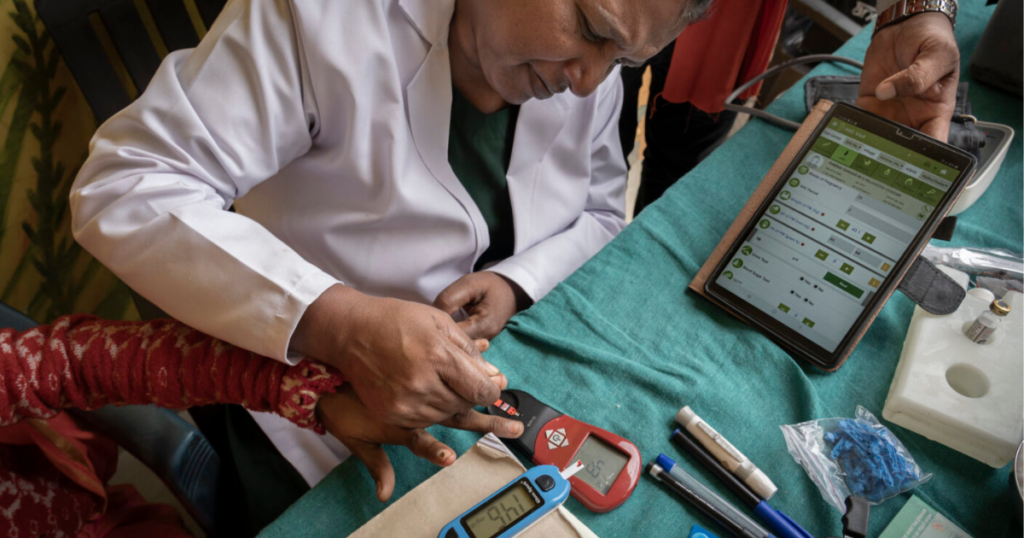Digital technology is emerging as a key enabler of healthcare delivery in India. Advanced technology such as AI and Blockchain are being deployed across a wide range of applications from patient management and care delivery to administration. Increasingly, digit al interventions are being linked to key healthcare outcomes such as improved quality and access, reduced costs, and increased personalisation.
In India, digital health interventions have grown to cover ~80% of the population, 300k health facilities and 400k health workers. This has been enabled through an array of policies and regulations that promote innovation, standardise service delivery, and strengthen the ecosystem, while offering relevant security measures such as data protection. The Ministry of Health and Family Welfare, Ministry of Electronics and Information Technology, and Ministry of Consumer Affairs are responsible for legislation around digital interventions, with the first two playing dominant roles.
ABDM intends to develop the backbone necessary to support the unified digital health infrastructure of the country by leveraging unique IDs, registry systems, and data analytics. The public health system has seen rapid adoption and integration with ABDM. Private facilities and providers are also being on boarded in record numbers. Private organisations , however, are increasingly involved in digital health
solutions, particularly in the health technology and MIS segments.
Recent digital health solutions have been developed to address the needs of an array of end users across the healthcare ecosystem. Solutions for health service users support health education and disease management, while certain services, like the ABDM consent manager, allow users control over their data. Capacity building solutions and patient management tools enable healthcare providers to dispense better quality care for their patients. Specialised digital solutions, like e-Aushadhi, a web based drug procurement system, strengthen governance and supply chain management. Data systems solutions bolster data collection, analysis, and exchange across the ecosystem.
Payers, providers, enablers contribute towards development and adoption of healthcare technology. As the premier policy-making body, the government and its ministries govern, finance, and design digital health programmes. Apex bodies, multilateral institutions, philanthropic bodies, NGOs, and industry associations hold influence over digital health policy. Philanthropic donors, in particular, play a significant role in funding or designing digital health programmes. However, most stakeholders in the ecosystem are involved in implementing digital health across both public and private sector entities.
The Government’s investment in digital health, demonstrated by ABDM budgetary allocation, has grown sharply from Rs. 30 crores in FY 2020-21 to Rs. 200 crores in 2023-24. In addition, private organisations also fund digital health solutions, however their funding has been uneven in recent times. Philanthropic organisations are also major funders, but the funding is usually project specific where digital health may be the primary or secondary component.
Stringent, effective regulations and sustainable financing have the potential to accelerate digital transformation at scale. A seamless regulatory mechanism for digital health will ease ecosystem navigation for solution providers. Investments, especially in infrastructure, are likely to benefit small healthcare providers and the public system where capital required for digital transformation is scarce. Most individual level challenges can be addressed by increasing access to technology among the underserved populations and improving awareness of digital health in citizens and providers.
Driven by technological innovation, healthcare will be more accessible, cost-effective, personalised, transparent, and collaborative. Digital health equity, however, is essential to ensure that the vulnerable populations are able to reap the benefits. Conscious decision making by policy makers and long term investments have the potential to drive digital health uptake, support solution providers, and create enabling environments. Efforts to advance digital literacy and further promote digitisation positively affect citizen behaviour, while providing capital assistance and offering innovative financial instruments promote innovation.
Contributors: Dr Aditi Hegde, Arnab Mukherjee, and Granthika Chatterjee.




